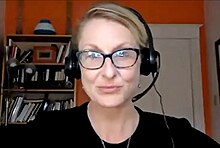Canadian sexologist
Meredith L. Chivers is a Canadian sexologist and clinical psychologist noted for her research on female sexuality, sexual orientation, paraphilias, sex differences, gender identity, and the physiology of sexual arousal.[1][2] She is an associate professor in the Department of Psychology at Queen's University in Kingston, Ontario, Canada.[3]
Education and career
Chivers attended the University of Guelph for her undergraduate agree. In 2003, she earned her Ph.D. in clinical psychology from Northwestern University.[4][5] She has been a faculty member at Queen's University since 2009, where she is director of the Sexuality and Gender Lab.[4][5]
In 2019, Chivers was appointed as a Fellow of the Society for the Scientific Study of Sexuality, an honour given to two individuals each year.[6]
Research
Chivers's research interests include sexual attractions, sexual response, sexual functioning, and the psychophysiology of sexual arousal.[3][5]
In one line of research, Chivers measured biological and sexual responses of men and women to different types of pornography to analyze human sexual response patterns. By testing both heterosexual and homosexual men and women, Chivers found that men (both heterosexual and gay) respond with "category specificity" whereas women (heterosexual and lesbian) respond more broadly.[1] In 2005, Chivers co-authored a study of bisexual men, in which the men's responses to heterosexual and homosexual photos were shown. Despite that the men reported being bisexual, most of them showed a substantially stronger response either one of the two sexes instead of roughly equal responses to both.[7][8]
After reports that women respond with vaginal lubrication even to stimuli depicting rape, Chivers hypothesized that the lubrication might not relate only to female sexual desire, that it is also a separate system, an evolutionary adaptive one, that protect females from damage in sexual violence.[9]
